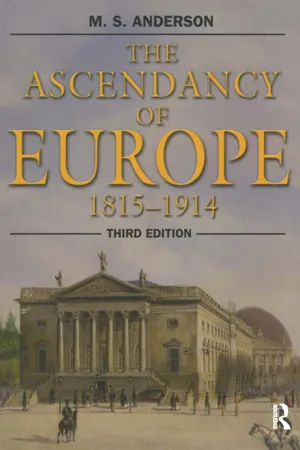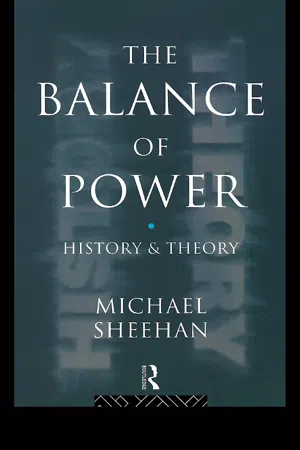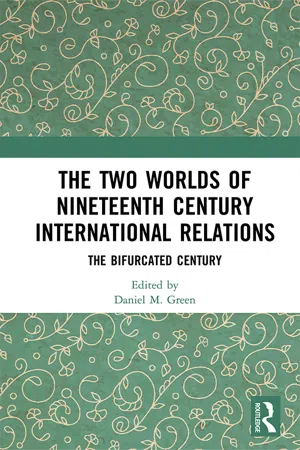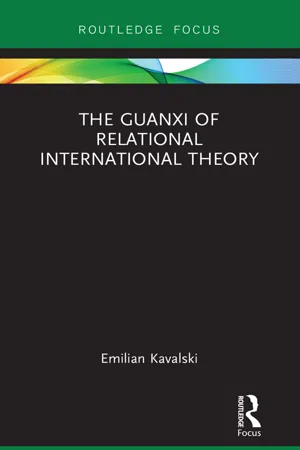History
Concert of Europe
The Concert of Europe refers to a system of international relations established in the early 19th century to maintain the balance of power and prevent major conflicts. It involved regular meetings between the major European powers to address diplomatic issues and maintain stability. The Concert of Europe aimed to prevent the resurgence of widespread conflict following the Napoleonic Wars.
Written by Perlego with AI-assistance
Related key terms
7 Key excerpts on "Concert of Europe"
- eBook - ePub
The Ascendancy of Europe
1815-1914
- M.S. Anderson(Author)
- 2014(Publication Date)
- Routledge(Publisher)
In spite of what has been said in the preceding pages it would be highly inaccurate to think of the decades which followed Waterloo as an age of acute and self-conscious competition between states on the economic or even the political plane. By comparison with the period from the 1860s to 1914 they were in general remarkably lacking in feeling of this kind. Alexander ls dream of some kind of formalized international cooperation had faded beyond recall by the early 1820s; but the idea of the ‘Concert of Europe’ continued to influence statesmen and to blunt the edge of national and state selfishness, though with slowly declining effect, until the middle of the century. The effective cooperation of the great powers in the interests of international peace and stability continued to be an ideal to which something more than lip-service was paid. There was still a widespread feeling that, in particular, significant territorial changes in Europe should be made only with the agreement of these powers. The emergence of an independent Belgium in 1830–39, the product of very long and difficult negotiations, was a triumph for the ‘concert’ idea. So was the establishment, by the Straits Convention of June 1841, of a set of internationally agreed rules regarding the passage of ships of war through the Bosphorus and Dardanelles which were to last, in essentials, for over eighty years.The Concert of Europe idea, like every aspiration towards order and stability, was at bottom conservative. Its most consistent supporter, Metternich, whose policy from 1822 until his fall in 1848 has been described as ‘a continuous chain of rearguard actions to delay, to cover, and to argue away the breakdown of the Concert of Europe and all it stood for’,19 was influenced above all by forebodings about the future of the Habsburg empire, which an effective concert of the powers would do much to safeguard. In particular his desire for cooperation with Russia in the 1830s and 1840s was based in part on his morbid fear of the forces of revolution in Europe. Also the concert had important practical limitations. It could not prevent Russia from independently imposing peace terms on the Turks in 1829; and there was never any suggestion that it should operate outside Europe. Even the French conquest of Algeria after 1830 lay outside its scope. Nevertheless, vague and restricted though it was, within its limits it was real, perhaps all the more so for being unspecific and therefore flexible.Moreover the ideal of giving the political unity of Europe some visible institutional form had never been completely abandoned. By the middle of the century it was assuming a new shape, as to the alleged threat to Europe from Russia in the east was added the new one apparently created by the phenomenally growing United States across the Atlantic. The American republic had not played a significant role in the calculations of any statesman during the peace settlement of 1814–15. Between the 1830s and 1850s, however, it was visited and studied by a number of the most important writers on politics of the period – de Tocqueville, List, Fröbel – and their books spread the idea that Europe’s leadership of the world was now threatened by the growth of these gigantic extra-European states in east and west and perhaps must inevitably be lost to them as their overwhelming power developed. There are only two peoples’, wrote the French critic Sainte-Beuve in 1847. ‘Russia is still barbarous, but she is great…. The other youthful people is America … the future of the world is there, between these two great worlds.’20 Almost simultaneously in Germany the radical Bruno Bauer was speculating gloomily on the imminent emergence of Russia and the United States as the only true world powers.21 Such forecasts tended to the conclusion that European union (most usually envisaged as some form of federation) was essential if the world centre of civilization and progress were to escape eclipse and even subjection. A series of writers – J. E. Jörg, Fröbel and Constantin Frantz in Germany, the historian Henri Martin in France – put forward in varying forms ideas of this kind around and just after the middle of the century.22 - eBook - ePub
The Balance Of Power
History & Theory
- Michael Sheehan(Author)
- 2004(Publication Date)
- Routledge(Publisher)
One of the features of the concert system was that it was more explicitly a great power system than its eighteenth-century predecessor. The lesser states had few rights and were not treated as equal members of the system. The justification for this offered by von Gentz in 1818, that the five powers at the head of the federation were the only ones who could destroy the general system by changing their policies is a valid one. The ‘concert’ served as a mechanism for managing the rivalry between the great powers.Unlike the statesmen of 1713–14, those of 1815 believed that a means needed to be found to enable rapid consultation and cooperation of states in the event of a future threat to the European balance of power. It was the absence of such a mechanism, they felt, which had been one of the major weaknesses of the eighteenth century balance of power system. The method chosen was not to create an international organisation, but rather to make more or less permanent the wartime great power alliance and to hold periodic conferences at foreign minister level, in the words of the Quadruple Alliance (November 1815), ‘for the purpose of consulting upon their interests, or for the consideration of measures which…shall be considered the most salutary for the purpose and prosperity of Nations and the maintenance of the Peace of Europe’ (Craig and George, 1990:31). These conferences were to be more frequent than those which had followed the Utrecht settlement a century earlier. In all, the period 1822 to 1914 saw a total of 26 conferences in which all the great powers were represented. The permanence of the wartime alliance had been established by the Treaty of Chaumont, of March 1814, prior to the final defeat of Napoleon.Henry Kissinger has argued (1955:266) that there are in practice two potential forms of equilibrium. The first, analogous to the eighteenth-century system, acts as a deterrent to a state seeking hegemony. The second, a ‘special equilibrium’, is a ‘condition of smooth cooperation’. For Kissinger, the concert system was an example of the second form of equilibrium.Although it was not without its critics, by and large the concert system served Europe well over the subsequent four decades. The great powers themselves demonstrated a notable restraint in the exercise of their dominance, which was clearly instrumental in commending it to the less powerful states in the system. The most powerful of the second rank states not surprisingly resented the existence of this ‘senior management group’ for the European state system, while the small states accepted the dominant position of the great powers and looked to them for protection. Many, indeed, found in a great power patron a guarantee both against external aggression and against internal revolution. - eBook - ePub
The Two Worlds of Nineteenth Century International Relations
The Bifurcated Century
- Daniel M Green(Author)
- 2018(Publication Date)
- Routledge(Publisher)
in parallel to its failures the Concert also jointly managed several affairs. In 1860–1861, the Concert mandated a collective intervention, mostly carried out by France, in Syria to protect Christian minorities. In 1867, the great powers convened to resolve a minor affair about the duchy of Luxembourg. And during the Franco-Prussian war, a conference met in London in early 1871 to discuss the Russian attempts to remilitarize the Black Sea and negotiated a new agreement which allowed the Russian remilitarization while upholding Ottoman control of the Dardanelles.In important respects, the London conference of 1871 ended the Concert’s crisis period and inaugurated the second phase of concert politics which would last until the First World War. In particular, the London conference reaffirmed, to quote the French plenipotentiary, the “salutary rule of the European family of nations,” namely “that no essential change should be introduced into the relations of nations towards one another without the examination and consent of all the Great Powers” (House of Commons, 1871: 38). The great powers thus renewed their commitment to concert practices as the primary means for managing and resolving important European affairs.The second Concert phase was, like the first, characterized by the absence of war between the Concert members and by the ongoing use of concert practices. To name but the more important Concert activities: the Concert resolved the Eastern crisis of 1877–1878 over a Russian war against the Ottoman Empire through a collectively sanctioned agreement at the Congress of Berlin 1878. It met in a series of two conferences pertaining to the delimitation of the Greek-Ottoman boundaries in Berlin and Constantinople in 1880–1881. In 1886, it enacted a sea blockade against Greece to avert a Greek war against the Ottoman Empire. In 1896–1898, the Concert managed the crisis over the Greek-Ottoman War, again employing a sea blockade against Greece (in 1897) and then collectively occupied Crete. The collective occupation was carried out by Great Britain, France, Russia, and Italy and lasted until 1908. For important questions, though, the other two Concert powers were also consulted. In 1912–1913, finally, the Balkan wars led to a conference in London which decided upon the political order in the Balkans (and inter alia recognized Albania as a new state independent from the Ottoman Empire). - eBook - ePub
- Henry Kissinger(Author)
- 2011(Publication Date)
- Simon & Schuster(Publisher)
CHAPTER FOUR
The Concert of Europe: Great Britain, Austria, and Russia
W hile Napoleon was enduring his first exile, at Elba, the victors of the Napoleonic Wars assembled at Vienna in September 1814 to plan the postwar world. The Congress of Vienna continued to meet all during Napoleon’s escape from Elba and his final defeat at Waterloo. In the meantime, the need to rebuild the international order had become even more urgent.Prince von Metternich served as Austria’s negotiator, though, with the Congress meeting in Vienna, the Austrian Emperor was never far from the scene. The King of Prussia sent Prince von Hardenberg, and the newly restored Louis XVIII of France relied on Talleyrand, who thereby maintained his record of having served every French ruler since before the revolution. Tsar Alexander I, refusing to yield the Russian pride of place to anyone, came to speak for himself. The English Foreign Secretary, Lord Castlereagh, negotiated on Great Britain’s behalf.These five men achieved what they had set out to do. After the Congress of Vienna, Europe experienced the longest period of peace it had ever known. No war at all took place among the Great Powers for forty years, and after the Crimean War of 1854, no general war for another sixty. The Vienna settlement corresponded to the Pitt Plan so literally that, when Castlereagh submitted it to Parliament, he attached a draft of the original British design to show how closely it had been followed.Paradoxically, this international order, which was created more explicitly in the name of the balance of power than any other before or since, relied the least on power to maintain itself. This unique state of affairs occurred partly because the equilibrium was designed so well that it could only be overthrown by an effort of a magnitude too difficult to mount. But the most important reason was that the Continental countries were knit together by a sense of shared values. There was not only a physical equilibrium, but a moral one. Power and justice were in substantial harmony. The balance of power reduces the opportunities for using force; a shared sense of justice reduces the desire to use force. An international order which is not considered just will be challenged sooner or later. But how a people perceives the fairness of a particular world order is determined as much by its domestic institutions as by judgments on tactical foreign-policy issues. For that reason, compatibility between domestic institutions is a reinforcement for peace. Ironic as it may seem, Metternich presaged Wilson, in the sense that he believed that a shared concept of justice was a prerequisite for international order, however diametrically opposed his idea of justice was to what Wilson sought to institutionalize in the twentieth century. - eBook - ePub
- Emilian Kavalski(Author)
- 2017(Publication Date)
- Routledge(Publisher)
Perhaps the key element of the standard IR narrative about the Congress of Vienna, the assertion that it provided a governance mechanism able to maintain peace on the continent for nearly a century, is surprisingly easy to dispute. To begin with, there are quite a few commentators who renounce the very peace-keeping function of the Vienna system. As some have argued, ‘it was the peace which maintained the Concert and not the Concert that maintained the peace’ (Medlicott 1956: 18; Elrod 1976: 160; Gulick 1955: 156–159). The point here is that the Concert had little (if any) substantive bearing on the behaviour of states – regardless of whether they were great powers or not. In fact, the claim is that if such peace-keeping function existed at all, it was never more than a ‘simulacrum of stability’ (Zamoyski 2001: 569) – that is, a rhetorical façade for the pursuit of more tangible and narrow self-interest (Rendall 2000). In fact, the phrase ‘diplomatic theatre’ has its origins in what many at the time (especially in the host country of Austria) considered to be a vacuous and pointless expense associated with the ‘evacuation of purpose from the residual and retrograde diplomatic entertainments performed at the Congress of Vienna’ (Welch 2017: 211). Even someone as invested in the success of the gathering as Friedrich von Gentz found himself conceding that:Never have the expectations of the general public been as excited as they were before the opening of this solemn assembly. People were confident of a general reform of the political system of Europe, of the Guarantee of eternal peace, even of the return of the Golden age. Yet, it produced only restitutions decided beforehand by the force of arms, arrangements between the great powers, unfavourable to the future balance and the maintenance of peace in Europe, and some quite arbitrary rearrangements on the possessions of the lesser states, but not one act of a more elevated character, not one measure of public order or security which might compensate humanity for any part of its long sufferings or reassure it as to the future.(quoted in Zamoyski 2001: 550)In this respect, a number of commentators have asserted that the ‘long nineteenth century’ is marked by far more conflict and rivalry and far less cooperation than the standard account of the Concert of Europe would admit (Kagan 1997: 50; Richardson 1994). At the same time, while agreeing in principle with the peace-keeping function of the Congress of Vienna, others have disputed its longevity. Depending on their point of departure and framework of analysis, different authors point to different dates when the Concert system ceased to exist. These range from the 1822 Congress of Verona (Nichols 1971), through the death of the Russian Tsar Alexander I in 1825 (Setton-Watson 1955), the expulsion of France from the Concert in July 1840 (Bullen 1979), the revolutions that swept through the continent in 1848 (Kratochwil and Ruggie 1986), to the 1853–1856 Crimean War (Elrod 1976).In other words, even if it did exist as a system for the maintenance of peace on the continent and the management of order between the great powers of the day, the Concert of Europe was hardly a century-long phenomenon. In particular, as the so-called ‘Eastern question’7 - eBook - ePub
Great Power Multilateralism and the Prevention of War
Debating a 21st Century Concert of Powers
- Harald Muller, Carsten Rauch(Authors)
- 2017(Publication Date)
- Routledge(Publisher)
Membership. Membership of the Concert of Europe was self-selecting (Holsti 1992, 35–6), but informal hierarchies shaped its operation in important ways. For example, Schroeder argues that Russian and British hegemony was a key feature of the Vienna settlement: Far from being ordered by a group of equal great powers, it was a “pentarchy composed of two superpowers [Russia and Britain], one authentic but vulnerable great power [France], one highly marginal and even more vulnerable great power [Austria], and one power called great by courtesy only [Prussia]” (Schroeder 1992, 688). Moreover, these great powers were imperial states, though of differing kinds: Austria was an imperial European state, Russia was an imperial European and Asian state, Britain ruled a colonial empire and France also ruled a colonial empire (though it was substantially rebuilt only from the 1830s onward), while Prussia, though ruling a small German empire, only acquired significant overseas colonies as part of a united Germany in the 1880s. These features of Concert membership illustrate the extent to which any concert is likely to be characterized by historical particularity and contingency. They suggest that no direct inference should be drawn from the Concert of Europe about the required number of great powers for a concert to operate, about the kinds of states involved (including precisely where the line is drawn between great powers and the rest) or about the nature of the informal hierarchies that may or may not operate within a concert order.Objectives. The Concert of Europe emerged when the risk of further great power war was widely believed to be so damaging that the great powers would rather act in concert. Although its origins lay in an alliance against France, it quickly lost this ad hominem quality. Functionally, it operated in the security domain, and within that domain it provided order, in contrast to the more ideological agenda pursued by the Holy Alliance. These features of the Concert were all reflected in the commitment of the Quadruple (and later Quintuple) Alliance to maintaining the provisions of the Vienna treaty order and to employing great power conferences to resolve future threats to a stable international order (Lauren 1983, 35–6). However, the construction of particular issues, such as the Eastern question, as security problems was very much a feature of its time, reflecting both the imperial basis of the 19th century system and also the extent to which the very concept of security was, at that time, detachable from other goods such as self-determination and human rights. It is not obvious that a similar separation is either feasible or desirable today. I contend, therefore, that how the security domain is demarcated should be treated as specific to each putative concert.Interests. - eBook - ePub
- Frederick C. Schneid(Author)
- 2017(Publication Date)
- Routledge(Publisher)
Part I The Congress of Vienna and the Concert of EuropePassage contains an image
PAUL W. SCHROEDER[1]AHR Forum Did the Vienna Settlement Rest on a Balance of Power?THE QUESTION POSED by the title of this essay must appear a bit unreal. However much historians have differed in interpreting various aspects of the Vienna settlement and the nineteenth-century international system founded upon it, they have never doubted that these included a balance of power as an essential ingredient.1 Irrefutable evidence seems to come directly from the peacemakers at Vienna themselves; in everything from official treaties to private letters and diaries, they spoke of peace and stability in terms of a proper balance (“juste équilibre”) achieved by a redistribution of forces (“répartition des forces”), or in similar balance of power phrases.2 Not only did their language seem to make the balance of power a vital goal and working principle of the settlement but so did their conduct and the outcome of their efforts. What else were the statesmen at Vienna doing if not restoring a balance of power in Europe by redistributing territories and peoples? What can account for international peace and stability after 1815 if not that the European balance of power was restored after a generation of French revolutionary expansion and Napoleonic imperialism, this time supported and strengthened through a system of alliances, treaty guarantees, and Concert diplomacy?The balance of power interpretation of the Vienna settlement appears so obvious that a challenge to it is likely to be understood as merely a call to redefine or reclassify it, involving a taxonomic dispute of the sort familiar to historians. A scholar may deny, for example, that there was a Renaissance in the thirteenth century and mean by the denial only that conditions prevailing in the thirteenth century do not fit his or her definition and taxonomic requirements for a “genuine” Renaissance. This essay is not that kind of challenge to the balance of power interpretation of the Vienna settlement. It may seem so at times, simply because the case to be made here, necessarily a prima facie one, involves some definition and interpretation of balance language and ideas. It will always remain possible to argue that a different definition of balance of power would meet the objections to be raised in regard to 1815. Nonetheless, the thesis is not that the 1815 balance of power needs to be defined or understood differently, or that the settlement represented a particular, modified kind of balance of power,3
Learn about this page
Index pages curate the most relevant extracts from our library of academic textbooks. They’ve been created using an in-house natural language model (NLM), each adding context and meaning to key research topics.






